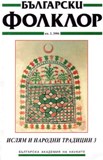Представи за Добруджа в османотурската мистична книжнина от XV в.
Notions of Dobrudzha in the Ottoman-Turkish Mystic Literature from the 15th C.
Author(s): Bozhidar AleksievSubject(s): Anthropology
Published by: Институт за етнология и фолклористика с Етнографски музей при БАН
Summary/Abstract: The name Dobrudzha is met comparatively often in the literature created by the followers of the mystic trend in Islam (or influenced by it) in fhe central part of the Ottoman Empire in the 15th c. The Destan for Umur Pasha, Emir of Aydın represents a narrative poem, combining elements of heroic epics with descriptions of historical events, which is known as the eighteenth book of Düsturname by Enveri (1465). The subject of research is the description of Umur’s quest by sea to the delta of the river Danube and the main motif in it – the simulated cannibalism of the conquerors. Historical, literary-historical and cultural-anthropological analyses allow us to consider that in an extremely specific and original manner Enveri succeeds to imply a multitude of meanings in this episode. In regards with the Danube and the adjoining lands he suggests the idea of frontier, bound of the civilized world. Similar notions are to be found in the Vilayetname of Hajji Bektash Veli. The advent of Saru Saltuk in Dobrudzha generates the opposition Christianity/Islam. Unlike the destan, the vilayetname gives a symbolic expression of the rivalry between the representatives of the two religions by Saltuk’s victory over the dragon, which turns out to be a sufficient argument for the conversion of the local ruler to Islam. The Vilayetname of Otman Baba (1483) presents an inhabitant of Dobrudzha, who stands out among the other characters with the strength of his faith and his generosity. This positive in religious aspect characteristic could be also assigned to the homeland of Otman’s anonymous follower. As a land of fertility and abundance, Dobrudzha is described in a poem by Kaygusuz Abdal. The research points out that the two types of notions of Dobrudzha are conditioned by the ideological and semantic contexts of the works. In the first two of them the name of Dobrudzha appears in connection with the idea of sacred war as a road to individual salvation. The second couple of works suggest the notion of a metaphysical Dobrudzha, seen through the eyes of mystics, who have already passed most of the road to spiritual perfection and salvation.
Journal: Български фолклор
- Issue Year: XXXII/2006
- Issue No: 2
- Page Range: 94-108
- Page Count: 15
- Language: Bulgarian
- Content File-PDF

